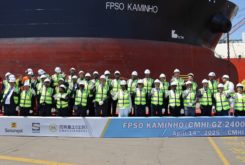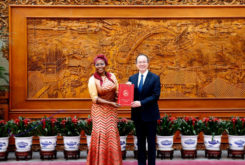Asian players in the energy sector have gained a substantial foothold in Mozambique´s liquefied natural gas (LNG) projects, but they have been less active in Angola´s oil sector. They are, however, expected to be active in Angola´s new oil exploration licensing rounds, to be launched in the coming months.
In the wake of substantial reforms, aimed at attracting foreign investment for the oil sector, which is largely the country´s major source of exports and foreign currency, a new Presidential Decree (No. 52/19) detailing the country’s oil licensing strategy for the next six years was released in February.
The new decree defines the country’s new general strategy for the attribution of its petroleum concessions up until 2025, with the objective of “increasing the production of oil and gas” and “ensuring the substitution of reserves to replace the evident decline in production in recent years”.
From its peak of almost 1.9 million barrels per day (bpd) in 2008, Angola’s oil production has been decreasing to reach 1.478 million bpd, owing to the depletion of existing wells, and to a lack of investment in new developments since the beginning of the oil price decline in 2014, which led to a three-year recession in Angola.
The decree determines that in 2019 are to be awarded under public bidding blocks in the Namibe Basin (11, 12, 13, 27, 28, 29, 41, 42 and 43) and in the Benguela Basin (Block 10).
In 2020, it will be the turn of blocks in the Congo Basin (CON1, CON5 and CON6, onshore) and the Cuanza Basin (KON5, KON6, KON8, KON9, KON17 and KON20, onshore).
Subject to public bidding in 2023 will be blocks in the Congo Basin (CON2, CON3, CON7 and CON7, onshore) and the Cuanza Basin (KON1, KON3, KON7, KON10, KON13, KON14, KON15 and KON19, onshore).
The main oil producers in Angola are currently Chevron (US), ExxonMobil (US), Total (France), BP (United Kingdom) and ENI (Italy).
China’s no.2 oil and gas producer after PetroChina, Sinopec International Petroleum Exploration and Production Corporation (SIPC), a wholly-owned subsidiary of Sinopec Group, has a stake in Block 32, under exploration.
China Sonangol has a joint venture with Sinopec in Sonangol Sinopec International, which holds a 50% participating interest in Block 18 in Angola, operated by BP, that contains the Greater Plutonio, has interests in eight other oil blocks in Angola and one onshore oil block in Indonesia.
Angolan oil sector sources expect Chinese oil companies, as well as from other Asian countries currently active in securing energy sources worldwide, namely South Korea, India and Thailand, to take part in the new licensing rounds.
The new decree stipulates that petroleum concessions are to be awarded under three different modalities: public bidding, limited public bidding and direct negotiation.
The public tender and bidding avenue follow the legally-established procedure for the award of oil concessions under a competitive auction, in which state-owned Sonangol is entitled to a 20% stake in research operations in the case where it is not the operator of the block.
A second modality, for reasons of national strategic interest, will be a limited public bidding, restricted to a number of previously-selected companies, that applies to the blocks and contract areas that have been returned to the State.
In this case, eligible bidders will be selected from companies that have demonstrated knowledge, expertise and both technical and technological competence operating in Angola.
The procedure will apply in 2021 to maritime blocks 7, 8, 9, 16, 33 and 34, and to free area blocks 31 and 32, and in 2025 to blocks 22, 24, 25, 26, 35, 36, 37, 38, 39 and 40.
Finally, blocks 6, 30, 44, 45, 46 and 47 are open to direct negotiations, which must be concluded before the end of the first semester of 2019.
Successful companies must enter into a Service-at-Risk Contract and demonstrate relevant proven experience, expertise, technical and technological capabilities operating in Angola or other oil provinces.
With the goal of boosting investment in the oil sector, the government is also preparing the country’s first Marginal Fields Bidding Round.
The sector´s reform has entailed the approval of multiple legislation, including presidential decrees related to the governance and regulation of its oil & gas sector; establishing the framework for the exploration activities of the development areas; regulating the development of marginal fields and regulating the prospection, research, evaluation, development, production and sale of natural gas.
The main axes of reform were the simplification of procedures in order to expedite the start-up of new exploration and production operations and reduce associated costs in order to make investments in the local oil industry more competitive.
The reforms, led by SNL’s new PCA Carlos Saturnino and the oil minister Diamantino de Azevedo, resulted in an improvement in the levels of profitability of the oil majors in Angola and, in parallel, a new climate of confidence established between them and SNL EP.
The new management of Sonangol, the national oil company, defined as a priority the development of the natural gas sector, and the raising of investments for the development of identified reserves.
The Cuanza basin, still under-studied, is the region with the highest potential natural gas fields, and where investments are expected to be strengthened.
In order to accelerate the development of new reserves, Sonangol has given priority to the amicable settlement of the legal dispute with Cobalt concerning blocks 20/11 and 21/09, paying USD 500 million to buy the blocks from the US oil company.
Contacts with interested oil companies to sell the blocks are still ongoing, and the winning company should contribute to the development of the sector´s masterplan, at a time when there are concerns about the supply capacity to the Angola LNG liquefaction unit, in Soyo, which due mainly to the insufficient supply of natural gas, currently operates only at around 2/3 of its capacity.
Suspended due to negative prospects for the launch of new investments in the gas sector previously prevailing, the masterplan should align gas production and consumption, covering the entire country.
As Soyo’s combined cycle power station, inaugurated in 2017, is supplied by Angola LNG to provide electricity to the cities of Soyo and Luanda, limitations on the operation of the unit may also jeopardize the already unstable operation of the power grid in the capital. (Ends)
(CLBrief)



